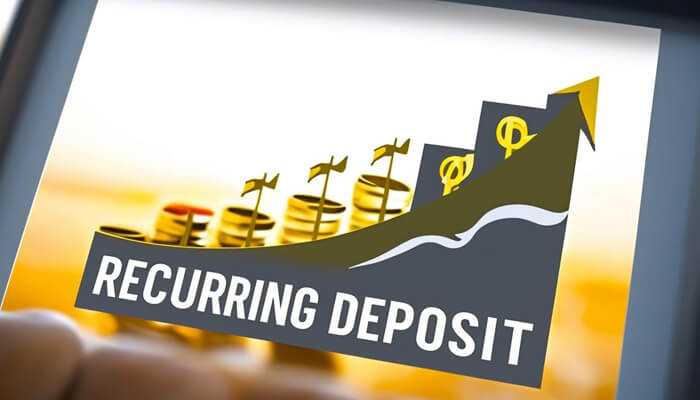Individuals often consider Recurring Deposits (RD) as a preferred method to save for the future. However, it is an investment strategy that can be both effective and poses a low risk. With RDs, a customer makes consistent monthly deposits which in turn earns them fixed returns over a period. If you do not wish to risk your funds in volatile investments, this is a suitable option. In this article, we will explain Recurring Deposit, their features, and benefits, and how they can help you achieve your financial goals.
What is a Recurring Deposit?
Recurring deposits or RDs, are fixed savings accounts offered by banks and other financial institutions. RDs are accounts that allow a person to deposit a set amount of funds every month for a certain period. Once the designated time elapses, the individual gets the principal deposit together with the interest earned during the time.
While many traditional forms of investing require a large sum of funds to start investing, RDs are unique as they allow you to save small amounts every month. This makes them a more favourable option for individuals with low budgets. To estimate the potential returns on your RD, you can use an RD Deposit Calculator, which helps you track your investment and make adjustments to your deposit amount or tenure if needed.
Features of Recurring Deposit
Here are some key features that make Recurring Deposits a suitable choice for many investors:
- Fixed Interest Rate: The interest rate is predetermined and remains the same throughout the investment period, providing stability.
- Regular Deposits: You must contribute a fixed amount every month for the agreed period, ensuring that you save regularly.
- Low-Risk Investment: RDs are a safe option as they are backed by banks and financial institutions, making them less risky.
- Flexibility in Tenure: You can choose the duration of your RD based on your financial goals, ranging from a few months to several years.
- Loan Facility: Many banks allow you to take a loan or overdraft against your RD in case of emergencies, providing liquidity without redeeming your investment.
Benefits of Recurring Deposit
There are several reasons why Recurring Deposits are favoured by many individuals:
- Steady Growth: RDs may offer predictable and assured returns, making them a reliable option for long-term savings.
- No Market Risk: Since the returns are fixed, RDs are not subject to stock market fluctuations.
- Financial Discipline: The monthly deposit requirement helps foster consistent saving, which is beneficial for those who struggle to save regularly.
- Easy to Open: RDs can be opened easily at any bank, and you can choose the amount and tenure that fits your financial goals.
Factors to Consider While Investing in Recurring Deposit.
Before investing in an RD, it’s important to consider a few key factors:
1. Interest Rates:
Interest rates vary depending on the bank and the tenure of your RD. It is important to compare rates across different banks to ensure you get the most suitable offer.
2. Deposit Amount:
Choose a monthly deposit amount that fits within your budget and does not strain your finances. Remember, the more you deposit each month, the higher your final returns will be.
3. Tenure:
Select a tenure that aligns with your financial goals. A longer tenure may provide more significant returns, but you should ensure you don’t need the funds before the maturity date.
4. Premature Withdrawal:
Banks usually impose a penalty for early withdrawal of RDs. If you anticipate that you may need your funds before the maturity date, make sure to check the bank’s terms and conditions.
Additionally, if you are considering diversifying your investments, you may explore options like SIPs through a mutual fund app. These apps make it easy to manage your investments alongside your RDs for a more balanced portfolio.
How does RD Help Plan Future Investments?
A Recurring Deposit can be a valuable tool in your broader financial planning strategy. Here’s how it fits into your future investment plans:
1. Long-Term Savings Goal
RDs can be suitable for setting aside funds for long-term goals, such as buying a home or planning for retirement. By contributing small amounts every month, you can gradually build a substantial amount over time.
2. Complementing Other Investments
RDs potentially offer a stable and low-risk alternative. If you already investing in SIPs or stocks, adding an RD to your portfolio provides balance and stability.
3. Emergency Fund Creation
Given the predictability of returns and the low risk involved, RDs can be an effective tool for creating an emergency fund. You can choose a short-term RD to build a fund corpus that can be accessed in case of urgent needs.
Conclusion
Recurring Deposits (RDs) offer a simple, low-risk way to save for the future, providing predictable returns. By regularly investing a fixed amount, you can accumulate a significant sum over time to meet your financial goals. An RD Deposit Calculator helps track potential returns, allowing adjustments to your deposit amount or tenure. While RDs can be suitable for long-term savings, they can complement other investment options, like SIPs, to diversify your portfolio. Understanding how to incorporate RDs into your financial planning can help you confidently achieve your financial objectives and ensure steady growth for your savings.



